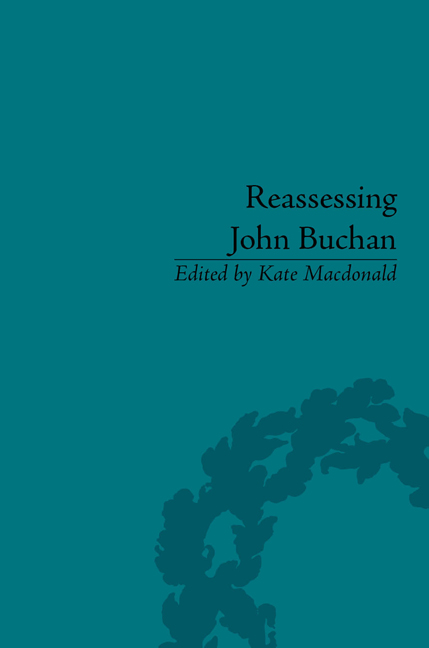Book contents
- Frontmatter
- CONTENTS
- List of contributors
- Introduction
- I Cultural Roots
- 1 John Buchan and Calvinism
- 2 Buchan and the Classics
- 3 ‘Twin Loyalties’: John Buchan's England
- 4 Buchan, Sport and Masculinity
- 5 John Buchan and the Creation of the Springbok Warrior
- II Divided Loyalties
- III Literary Art
- Notes
- Works Cited
- Index
5 - John Buchan and the Creation of the Springbok Warrior
from I - Cultural Roots
- Frontmatter
- CONTENTS
- List of contributors
- Introduction
- I Cultural Roots
- 1 John Buchan and Calvinism
- 2 Buchan and the Classics
- 3 ‘Twin Loyalties’: John Buchan's England
- 4 Buchan, Sport and Masculinity
- 5 John Buchan and the Creation of the Springbok Warrior
- II Divided Loyalties
- III Literary Art
- Notes
- Works Cited
- Index
Summary
The quintessential, self-cultivated image of John Buchan as an imperial man of action and exponent of subterfuge was embodied nicely in two of his preoccupations during the First World War. These tugged him in very different directions, one secretive, the other showy. Buchan's persistent political energy went into low-level involvement in British war propaganda, while his historical imagination was put to work in launching a scholarly infantry offensive. One thrust was the provision of a multi-volume account of the Great War, serialized from 1915 to 1919 as Nelson's History of the War.
This brought on a second thrust, the crafting of a dashing authorized depiction of South Africa at war in Europe. Buchan had the right kind of overseas service pedigree for such an undertaking. An ardent imperialist from the provincial fringe, he had a close association with South Africa through his work in Britain's reconstruction administration after the end of the Anglo-Boer War of 1899–1902. At the outbreak of hostilities, he was a press correspondent, adventure story novelist and informed follower of military affairs. At almost forty years of age and not particularly fit, he spent the initial months of the conflict in bed. But, being Buchan, he was not so indisposed as to be unable to observe, scheme and write. Following a posting to France in 1915 as a war correspondent, he moved up a gear a year later when he joined Sir Douglas Haig's staff complement and got stuck into government war publicity and propaganda assignments. In February 1917 he was put in charge of a new Department of Information by the prime minister, David Lloyd George. This massively increased the propaganda directed at enemy troops, including airborne drops of German-language pamphlets explaining the advantages of surrendering, and assuring anyone who gave up of civilized Allied leniency.
While receptive to the value of new propaganda techniques from art and film to the mass presentation of large-scale war, Lieutenant-Colonel Buchan maintained a balance between flashy opportunism and traditional expertise.
- Type
- Chapter
- Information
- Reassessing John BuchanBeyond the Thirty Nine Steps, pp. 53 - 64Publisher: Pickering & ChattoFirst published in: 2014



